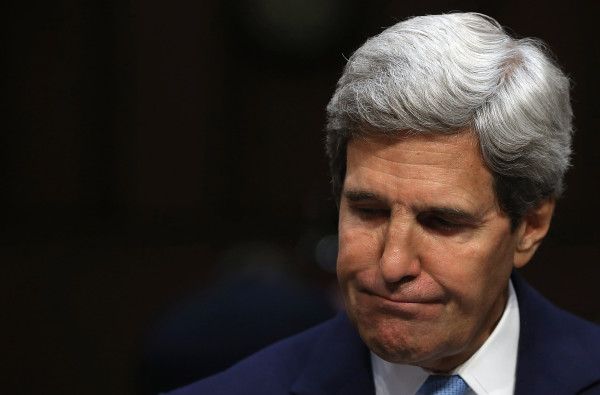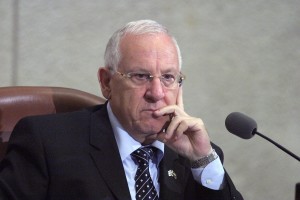by Mitchell Plitnick
On May 2 Israel’s most widely read newspaper, Yediot Ahoronot, published an article that blows the lid off the failure of U.S. Secretary of State John Kerry’s attempt to resolve the Israel-Palestine conflict. Nahum Barnea, one of Israel’s best-known reporters, got several U.S. officials who were involved with the talks to open up to him, anonymously, about what happened.
Barnea says that the version the U.S. officials present “… is fundamentally different to (sic) the one presented by Israeli officials.” The implication from Barnea, and the way most will read the U.S. revelations, is that Israel was the main party at fault. But a more sober and critical reading of what these officials say paints a different picture than the ones that the Israeli government, Barnea, or most of the initial reactions do.
In fact, what comes out is that Israel was not the primary culprit here. As has long been the case, the main reason for the failure of talks was — and is — the United States.
Combining amazing ignorance not only of the Palestinians but also of Israel and its politics, with a hint of anti-Semitism and a contemptuous attitude toward the Palestinians, tossing in some willful blindness to the realities on the ground and in the offices of politicians, the United States initiated a process that put the final nail in the two-state solution as it has been understood for years. Some, myself included, might consider that a good thing, as it enables the re-thinking of all the options, including other ways to conceive of two states (which I favor), as well as one state ideas. But the way this event has evolved has strengthened hard-liners in Israel, made the U.S. Congress even more myopic in its blind support for Israel and made it less likely that there will ever be a negotiated, rather than a violent, resolution to this conflict. In any case, this latest episode has likely kicked any resolution even farther into the future than it already was.
The U.S. failure goes well beyond the usual absurdity of the global superpower pretending to act as an honest broker in a conflict that involves an ally whose relationship with the U.S. is routinely described as “unshakeable” and is a regional superpower involved in a forty-seven year occupation of a completely powerless people. The U.S. culpability for this failure comes through in almost every response the anonymous diplomats make to Barnea’s questions. An examination of those responses and their implications is warranted.
The very first statement, in response to Barnea asking if the talks were doomed from the outset, would be shocking in its implication of incompetence if this wasn’t par for the U.S. course for the past twenty years. One of the anonymous diplomats says: “We didn’t realize Netanyahu was using the announcements of tenders for settlement construction as a way to ensure the survival of his own government. We didn’t realize continuing construction allowed ministers in his government to very effectively sabotage the success of the talks.”
How could they not realize this? Not for the last time in this article, one thinks they must be lying about their ignorance, but then, if they were going to lie, why would they make themselves look so stupid? You’d be hard-pressed to find a thoughtful analysis of Israeli Prime Minister Benjamin Netanyahu’s policies that doesn’t touch on this issue. Certainly one cannot read the Israeli press, across the political spectrum, and be unaware that settlement expansion was a key demand from much of Netanyahu’s coalition, including his own party. The idea that the U.S. negotiating team had such a paucity of knowledge, much less understanding, of their ally renders any U.S. involvement moot at best and destructive at worst, given its role as superpower patron and ostensible broker of negotiations. In the best of circumstances, a mediator cannot have a positive effect if she is this ignorant of either party to a dispute, let alone one they are so close to.
It gets better. The diplomats go on to say: “Only now, after talks blew up, did we learn that (settlement expansion) is also about expropriating land on a large scale. That does not reconcile with the agreement.” One is tempted to think the diplomat is lying here. It isn’t possible that they could have been unaware of the many statements made by Israeli leaders from Likud, HaBayit HaYehudi and other parties about annexing pieces of land. It is equally hard to believe that the U.S. has been deaf for years to the many cases brought up by oppositional Israeli groups regarding land appropriation.
Many of those groups, such as Peace Now and the human rights group, B’Tselem have a presence in Washington and regularly meet with State Department officials, as I can attest from first-hand experience. There has been no shortage of Israelis telling the U.S. that this was about land expropriation, whether through reports from the peace camp or pronouncements from the right-wing. But then one stops and again, has to ask, if they were lying, why would they make up a lie that shows the U.S. to be this incompetent and ignorant?
When asked why they pushed for these talks, one of the diplomats said, “Kerry thought of the future — he believed, and still does, that if the two sides can’t reach an accord, Israel is going to be in a lot worse shape than it is today.”
Now, granted, this was an interview with an Israeli reporter, but this sort of remark is still indicative of the U.S. bias. All this time the Palestinians have been living under occupation, without civil rights, seeing homes demolished, water taken, enduring settler attacks, and all the other inevitable hardships of military occupation. While one can understand the political necessity of doing this “for Israel,” the real imperative here is that millions of people under Israeli rule in the West Bank and Gaza Strip live without the basic rights most of us in the West take for granted. If remedying that, whether Israel likes it or not, doesn’t underlie your efforts, at least behind closed doors, you will inevitably fail. When there is no credible military threat in the region — and there has not been for many years despite Netanyahu’s frequent histrionics — the incentive for Israel to reach an agreement simply can’t be as great as it is for the Palestinians.
I mentioned above that the anonymous diplomats hinted at some anti-Semitism as well as contempt for Palestinians. The contempt for Palestinians has been evident throughout the process. The United States has long ignored the very significant concessions Palestinians have made over the years, and President Barack Obama and Kerry have been no different. On top of acknowledging that Israel would have control of 78% of what had been Palestine under the British Mandate before 1948 and repeatedly recognizing Israel without any reciprocal recognition by Israel (in Oslo, Israel merely recognized the PLO as the legitimate representatives of the Palestinian people), one of the interviewees noted:
[The Chairman of the Palestine Liberation Organization (PLO), Mahmoud Abbas] agreed to a demilitarized state; he agreed to the border outline so 80 percent of settlers would continue living in Israeli territory; he agreed for Israel to keep security sensitive areas for five years, and then the United States would take over. He also agreed that the Jewish neighborhoods in East Jerusalem would remain under Israeli sovereignty, and agreed that the return of Palestinians to Israel would depend on Israeli willingness. ‘Israel won’t be flooded with refugees,’ he promised. He told us: ‘Tell me if there’s another Arab leader that would have agreed to what I agreed to.’
And then there’s the attitude the U.S. officials anonymously express toward Jews: “The Jewish people are supposed to be smart; it is true that they’re also considered a stubborn nation. You’re supposed to know how to read the map: In the 21st century, the world will not keep tolerating the Israeli occupation. The occupation threatens Israel’s status in the world and threatens Israel as a Jewish state.”
I see! We Jews are smart and stubborn. So Israel has acted this way because it has a Jewish-majority population and is run almost entirely by Jews and, well, we Jews just can’t help ourselves because the stubbornness of ours stomps outdoes our superior intelligence. With this sort of thinking, is it any wonder the U.S. can’t grasp the basics of Israeli or Palestinian politics let alone their intricacies?
There’s also a scary bit of ignorance evident in the statement that “The Oslo Accords were Netanyahu’s creation.” Whatever else might be said about how Netanyahu gamed the Oslo Accords, he certainly didn’t create them. Indeed, he was so vocal in his opposition to them that many still hold him partially responsible for inciting the murder of Yitzhak Rabin, the Israeli prime minister who did, actually, sign the Accords.
But ignorance of history is not nearly as bad as complete cluelessness about the present. Barnea asked his interlocutors about Abbas’ stance in the latter stages of the process, and they said he had named three conditions absolutely required for continuing talks: Israel must agree to the outlining of borders as the first topic of discussion within a three-month deadline; Israel must agree to establish a timeline for evacuation of whatever settlers need to be evacuated; and East Jerusalem, whatever its borders, must be the capital of Palestine. All of those are necessary pieces of a framework for talks, but Israel flatly refused all of them.
When Barnea pointed out that agreeing to any of these would have meant the collapse of the Netanyahu government, here is how the U.S. officials responded: “We couldn’t confront the two sides with the painful solutions that were required of them. The Israelis didn’t have to face the possibility of splitting Jerusalem into two capitals; they didn’t have to deal with the meaning of a full withdrawal and the end of the occupation.” So then, can someone explain just what this was all about? If the U.S. is too timid to even broach with Israel the topics of sharing Jerusalem and ending the occupation, what is there to talk about?
More to the point, writers in newspapers all around the world, including many who clearly sided with Israel, have speculated on the inevitability of Netanyahu’s government falling if he reached an agreement with the Palestinians. Indeed, since 2011, both leaders of the Labor Party, the Israeli opposition’s largest party, Shelly Yachimovich and Isaac Herzog, have openly declared that they would join Netanyahu’s government to save his premiership for the sake of a peace agreement, as has the Meretz Party. One can speculate about whether that would have sufficed to save Bibi, or discuss how uninterested Netanyahu has always seemed to be in such an option. But, apparently, the U.S. delegation was not even aware of these considerations. It never occurred to Barnea’s interlocutors to discuss what could have kept a peace deal afloat and Netanyahu in office, even though such thinking appeared in countless media pieces in Israel, the U.S. and Europe. The only reasonable conclusion is that this entire line of thought never came up in State Department planning. If so, how could these talks have possibly succeeded, without some plan to save Netanyahu if they could get him to sign on the dotted line?
All of this begins to build the case that it is Israel that is acting according to its own interests as perceived by its leaders, while the U.S. is screwing up what diplomacy can possibly take hold here through its fecklessness, ignorance and simple incompetence. In part two of this piece, I will sum up this case and explain why Obama’s “time out” will not change the situation or exonerate the United States.






Lincoln,
I’ll go into this question in part 2. But for now, the basic point here is that, yes, this is obviously an attempt to blame Israel for the failure and exonerate the American performance. But the depth of ignorance and incompetence is such on the US team that what inadvertently happens is that they expose their own responsibility for the talks’ collapse, for the reasons I begin to lay out here and will complete in part 2.
Let’s start with the claim that the USA wasn’t aware that Natanyahu might/could use settlements as a tactic — to either create or destroy forward motion with an agreement with PA.
Is that credible? No. I don’t believe it. Indyck was there and he knows the ground. Just hard to believe that USA didn’t know OR that USA said that it didn’t know.
So since your basic premise is in-credible, why go further with it?
Your contention (that blaming the USA) is not persuasive.